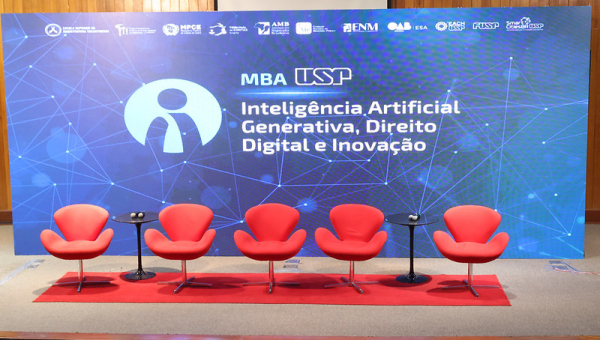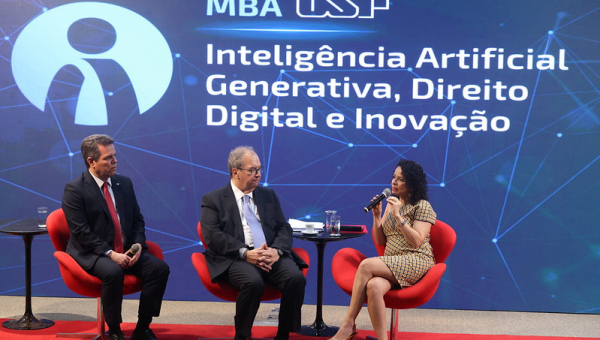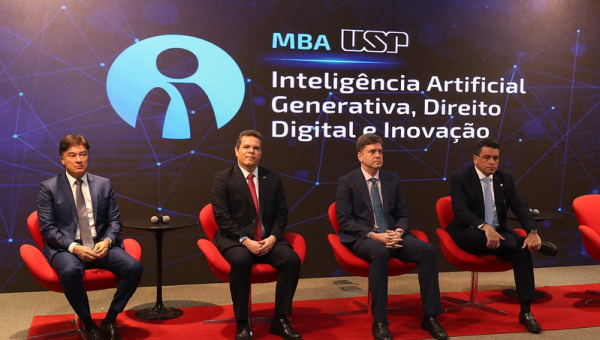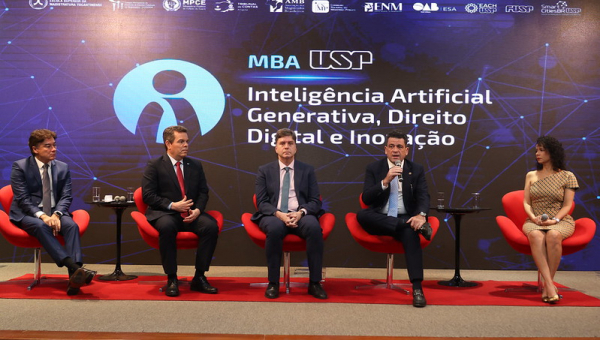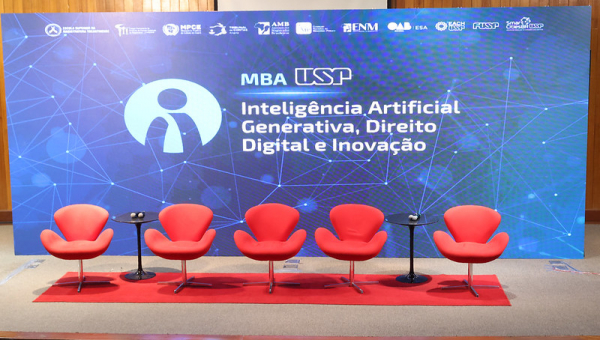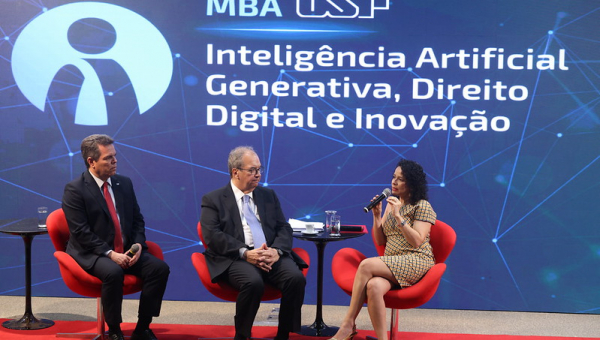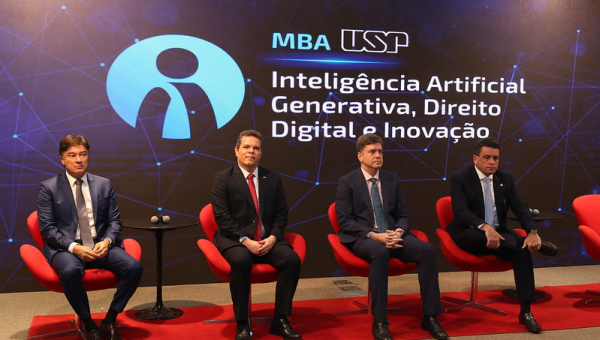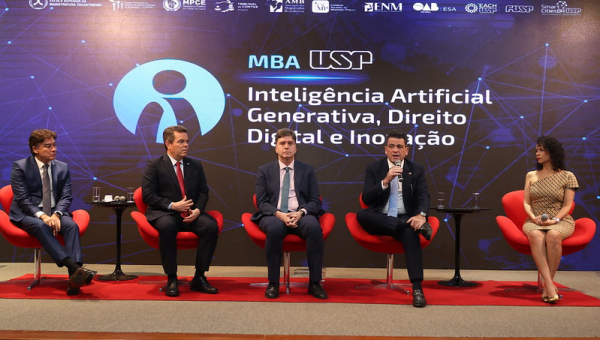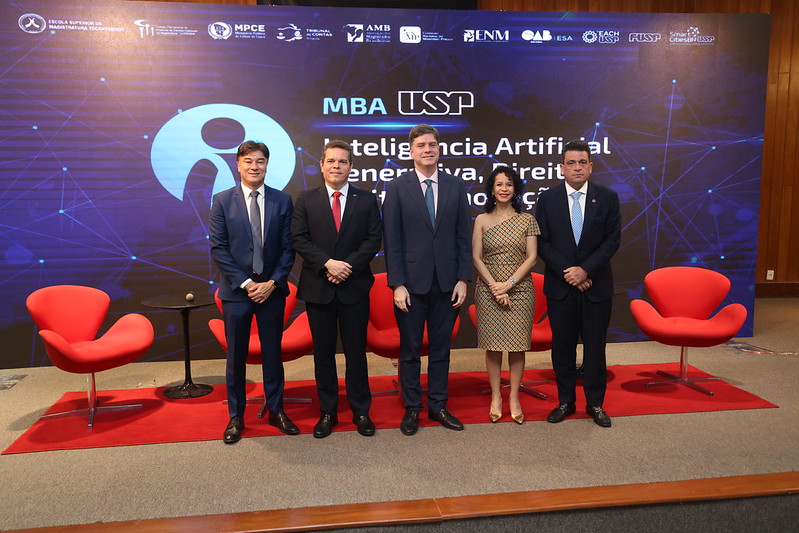
It was held on Thursday, September 18th, in the auditorium of the State Prosecution of the Federal District and Territories (MPDFT), in the city of Brasilia, the recording of the inaugural class of the post graduation course on LATO SENSU (MBA) "Generative Artificial Intelligence, Digital Law and Innovation". The course is the result of a partnership between the University of the State of São Paulo (USP), the National Council of the Public Prosecution (CNMP), the National School of the Magistracy (ENM), and the Permanent College of Directors of State Schools of the Magistracy (Copedem), among other institutions.
The module leads the way for broader debates on innovation and digital transformation in the Justice System, with a focus on ethics, governance and regulation. The content was contextualized within the proposal for national integration of the MBA, which is 100% ONLINE and provides recordings in different States to bring students and professors closer. Thus, the course seeks to democratize access to knowledge about Generative AI and stimulate the participation of magistrates, members of the Public Prosecution, lawyers and civil servers in a joint effort to build innovative solutions for the Justice System.
The first class was conducted by the minister of the Superior Court of Justice (STJ) Ricardo Villas Bôas Cueva. He addressed the topic on "Regulation of Artificial Intelligence by the National Legislative”.
The event was attended by the general attorney Justice of the Federal District and Territories and president of the National Council of General Attorneys of Justice of the States and the Union (CNPG), Georges Seigneur; the prosecutor of justice of the MPDFT (State Prosecution of the Federal District and Territories) and counselor of the CNMP (National Council of the Public Prosecution) (2021-2025), Moacyr Rey Filho; the counselor of the National Council of Justice (CNJ) Rodrigo Badaró; and the doctors professors of USP (University of the State of São Paulo) Ana Carla Bliacheriene and Luciano Vieira de Araújo.
Georges Seigneur highlighted that, about three years ago, the use of artificial intelligence in the scope of the Brazilian Public Prosecution was seen as a hypothesis, but today this technology has already consolidated, contributing to the improvement of prosecution action. He pointed out that partnerships with institutions such as USP guarantee the Justice System the technical knowledge and exchange of experiences necessary for the implementation and use of these tools.
“New technologies have brought much agility, but also concerns, especially in the field of data protection and processing. In this sense, we need to strengthen the partnership between academy and civil society to work together. Another point is the use of tools: artificial intelligence must be seen as a mechanism to support the legal professional, without losing the human character of action", he said.
Moacyr Rey pointed out that the use of AI will return quality time to members and civil servers of Justice, allowing more strategic performance in the end-activity.
“The partnership with USP will enhance our deliveries to society. The process of inserting tools occurs naturally and today what we seek is the change in institutional culture through training", he said.
The doctoral professors Ana Carla Bliacheriene and Luciano Vieira de Araújo emphasized that USP will offer all the necessary infrastructure, as well as professors and units with expertise in the area. According to them, the MBA will also have the participation of important names in the Justice System, protagonists in the process of transformation of the use of artificial intelligence in the Judiciary, Public Prosecution and the Law.
Foundations
In the afternoon of the inaugural class, USP professors conducted the presentation of the module on "Fundamentals of Active Generative Artificial Intelligence". The initial objective was to place the participants on the goals of the course, which seeks to integrate different areas of the Justice System around the understanding and responsible use of AI.
Professor Ana Carla Bliacheriene reinforced the pioneering and collective character of the program. "This project marks the beginning of a collective journey, which begins in this inaugural class and aims to prepare leaders to deal with the challenges of new technologies," she said.
During the exhibition, professors also emphasized the importance of understanding the introductory aspects of AI, especially with regard to its application in the Justice System. According to Professor Luciano, it is not necessary to have advanced technical training to accompany the MBA, since the content was structured to take advantage of the legal and institutional knowledge of the students. According to him, "artificial intelligence cannot be restricted to IT areas; it is necessary that different actors of the Justice System understand its potential and participate effectively in the construction of innovative solutions".
Watch the inaugural class here.




